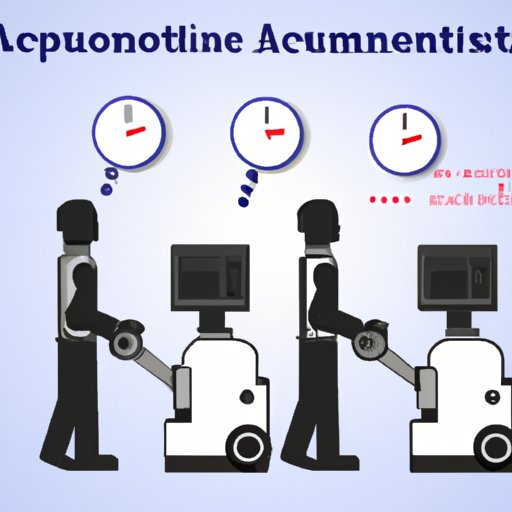Introduction
In recent years, automation has been transforming many industries, including accounting. As technology advances, it is becoming increasingly possible to automate certain aspects of the accounting process, such as bookkeeping and data entry. But what does this mean for the future of the accounting profession? In this article, we will explore the pros and cons of automating accountant tasks, and examine how automation is changing the accounting profession as a whole.

Exploring the Possibility of Automated Accountants
Automation is defined as the use of technology to control or monitor industrial tasks, processes, and operations without the need for human intervention. Automation is widely used in various industries, from manufacturing to healthcare. In the accounting field, automation can be used to streamline mundane tasks such as data entry, which can free up time for more complex tasks that require human judgement and expertise.
The Pros and Cons of Automating Accountant Tasks
When it comes to automation, there are both advantages and disadvantages. On the plus side, automation can help improve accuracy and reduce errors, as well as increase efficiency and productivity. Automation also eliminates the need for manual data entry and other tedious tasks, saving time and allowing accountants to focus on higher-value activities. However, there are also drawbacks to automation. For example, implementing automated systems can be expensive and time-consuming, and if not done correctly, may result in incorrect data and inaccurate reports.

How Automation Is Changing the Accounting Profession
Automation is having a significant impact on the accounting profession. According to a survey by the American Institute of CPAs (AICPA), “84% of firms are using some form of automation, while nearly half (49%) are now using robotic process automation.” This shift towards automation is helping to make the accounting profession more efficient and productive, as well as opening up new opportunities for accountants.
What Happens When Robots Take Over Accounting?
As automation becomes more widespread in the accounting profession, it is shifting the focus from number crunching to analysis. Automation is enabling faster and more accurate data processing, which allows accountants to spend more time interpreting and analyzing the data, rather than simply entering it into spreadsheets. Automation is also reducing the risk of errors and increasing accuracy, as machines are less likely to make mistakes than humans.

The Impact of Automation on Accounting Jobs
As automation becomes more prevalent in the accounting profession, it is also having an impact on jobs. While automation is creating new opportunities for accountants, it is also causing job losses due to the elimination of certain roles. It is estimated that “automation could destroy 1.4 million accounting jobs in the US by 2033,” according to a report by the World Economic Forum.
However, automation is also creating new opportunities for accountants. To keep up with the changes in the profession, many accountants are turning to reskilling and upskilling. By learning new skills such as coding and data analytics, accountants can stay ahead of the curve and remain competitive in the job market.
Conclusion
In conclusion, automation is having a significant impact on the accounting profession. While automation offers many benefits such as increased efficiency and accuracy, it also poses a threat to traditional accounting roles. To remain competitive, accountants must embrace automation and focus on reskilling and upskilling. The future of accounting is sure to be shaped by automation, and those who are willing to adapt will be best positioned to succeed.
(Note: Is this article not meeting your expectations? Do you have knowledge or insights to share? Unlock new opportunities and expand your reach by joining our authors team. Click Registration to join us and share your expertise with our readers.)
